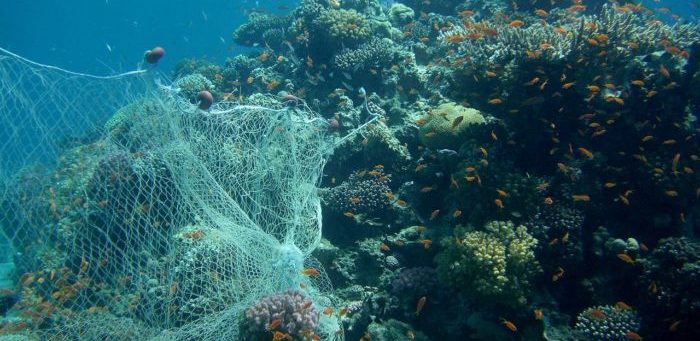The Global Ghost Gear Initiative (GGGI) announced that Fathoms Free, GGGI participant, and Cornish marine conservation volunteers dived with World Animal Protection, on Saturday April 8, from Penzance harbour, UK, to uncover fishing litter deep in coastal waters, as both seals and whales caught in ghost gear have been recently reported in the area.
Specifically, GGGI explains that a research commissioned by charity revealed tonnes of fishing gear, lost or abandoned, in the sea and washed up on the Cornish shore. GGGI participant, Cornwall Seal Group Research Trust, discovered 50 tonnes over a year and rescued trapped seals, sea birds and other marine wildlife. In addition, Fathoms Free has recovered some 8.5 tonnes of litter over two years.
On April 8th, the Fathoms Free crew head to St Michael’s Mount with a support boat alongside to recover a large fishing net on the ocean floor. This sea dive is the first official one of a 12-dive project.
Fathoms Free reuse and recycle the litter, some has been transformed into works of art such as their mascot, Casper the Cormorant, and some will be recycled to return to the sea as ocean kayaks, bodyboards and other exciting products, thus creating a circular economy and aiding further conservation efforts in the area, according to GGGI.
Rob Thompson, the group’s founder stated: “The inspiration behind Fathoms Free comes from witnessing community led change from others who sacrifice their time and energy to preserve our ecosystem. Through the self-perpetuation cycle of inspiring one another to drive change, we believe that collaboratively we will succeed in safeguarding the future of our seas. The time for waiting for change is over; it is time to be the change.”
The organization announced on April 7th, that launches a framework on the management of fishing gear, which provides the seafood industry – from port operators to seafood companies – with practical steps to decrease the abundance and effects of ghost gear within their respective industries.
“This is a big step towards implementing more sustainable fishing practices globally,” says Guy Dean, Vice President at Albion Fisheries Ltd., a GGGI participant. “Ghost gear is a very real impediment to sustainable seafood. Until now, a comprehensive approach to combatting ghost gear with recommendations for all fishery stakeholders, was lacking. The best practice framework provides just that. We’re now looking for feedback on the framework so we can adopt elements of these best practices into our business activities.”
“The framework presents 10 stakeholder groups with recommended approaches to combat ghost gear, each with an accompanying case study on how this has been achieved in practice. These include net recycling programs, derelict gear removal initiatives, and fishing management policy adjustments, among others. We really hope this will help the broader industry see change is both possible and practical” said Lynn Kavanagh, the Campaign Manager for Oceans and Wildlife at World Animal Protection, a GGGI participant.
Ghost gear, sometimes called abandoned, lost and discarded fishing gear, is fishing equipment which has been abandoned or lost and is now causing harm to fisheries and ocean ecosystems. Each year an estimated 640,000 tons of fishing gear is lost or abandoned in oceans, estuaries, and bays. Whether intentionally discarded or accidentally lost, this gear sticks around for hundreds of years and it catches and wastes targeted marine species, entangles marine wildlife, adds to ocean waste, and presents additional expenses and hazards for fishermen and marine communities.
Source: GGGI






























































